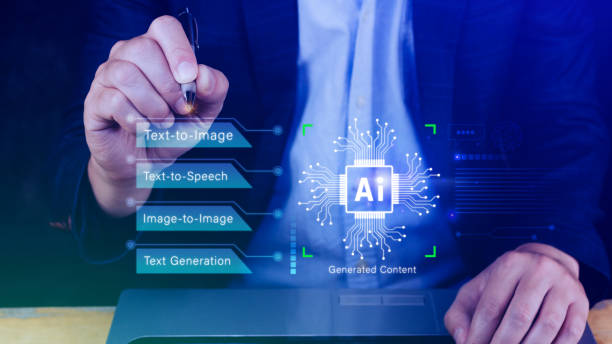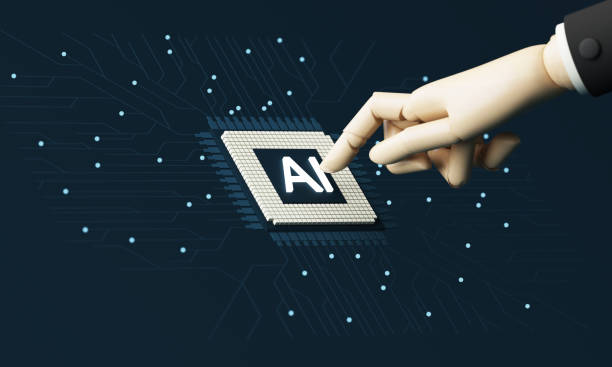What is Artificial Intelligence? Definition, History, and Applications
#Artificial_Intelligence (AI), or #AI for short, is a branch of computer science that deals with building intelligent machines, especially intelligent computer programs.
Simply put, artificial intelligence refers to systems that can perform tasks that usually require human intelligence, such as learning, problem-solving, language understanding, and pattern recognition.
The roots of artificial intelligence go back to the 1950s, when researchers began to explore the possibility of building machines that could think.
Alan Turing, one of the pioneers of this field, proposed the “Turing Test,” an experiment in which a machine is considered “intelligent” if it cannot be distinguished from a human.
Over the decades, artificial intelligence has experienced many ups and downs.
There have been periods of excitement and rapid progress, but also periods of frustration and reduced funding.
However, in recent years, artificial intelligence has seen a renaissance thanks to significant advances in computing power and access to vast amounts of data (big data).
Today, artificial intelligence is used in a wide range of applications, including:
- Self-driving cars Autonomous cars that drive using artificial intelligence.
- Virtual assistants such as Siri and Alexa that answer questions using natural language processing.
- Recommender systems such as Netflix and Amazon that use machine learning to suggest movies and products to users.
- Fraud detection in financial transactions.
- Medical diagnosis using the analysis of medical images.
Artificial intelligence is a broad concept and has become one of the most important technologies in the world in recent years.
Does your current online store design cause you to lose customers and sales?
Rasaweb is your solution with modern and user-friendly online store designs!
✅ Significant increase in conversion rates and sales
✅ Creating strong branding and gaining customer trust
⚡ Get a free online store design consultation from Rasaweb!
Types of Artificial Intelligence: Different Approaches to Creating Thinking Machines
Artificial intelligence is not just a single concept, but a collection of different approaches and techniques that share the common goal of creating machines with cognitive capabilities similar to humans.
In general, artificial intelligence can be divided into two main categories:
- Weak AI (Narrow AI) This type of artificial intelligence is designed to perform a specific task and performs very well in that area, but cannot perform other tasks.
Examples of weak AI include facial recognition systems, machine translation systems, and recommendation algorithms. - Strong AI (General AI) This type of artificial intelligence, sometimes referred to as “human-level artificial intelligence,” has cognitive capabilities similar to humans and can perform any task that a human can perform.
Strong AI is still a hypothetical concept and has not yet been fully realized.
In addition, there are different approaches to developing artificial intelligence, including:
- Machine Learning An approach in which machines learn from data without being explicitly programmed.
- Deep Learning A subset of machine learning that uses artificial neural networks with multiple layers to learn complex patterns in data.
- Natural Language Processing An approach that allows machines to understand and generate human language.
- Computer Vision An approach that allows machines to see and interpret images.
- Robotics A branch of engineering that deals with the design, construction, operation, and application of robots.
Robots are often combined with artificial intelligence systems to perform more complex tasks.
Choosing the right approach depends on the type of task we want the machine to perform and the available data.
For example, deep learning is very effective for image recognition and natural language processing, while expert systems are better suited for solving logical problems.
The ultimate goal of artificial intelligence is to create machines that can think, learn, and act like humans.
Machine Learning: The Beating Heart of Artificial Intelligence: How Machines Learn from Data
Machine Learning is one of the most important sub-branches of artificial intelligence that allows machines to learn from data without being explicitly programmed.
In fact, instead of giving machines precise instructions, we feed them with a vast amount of data and allow them to discover patterns and relationships in the data.
Machine learning is a broad concept and there are different algorithms for learning from data.
Some of the most common machine learning algorithms include:
- Regression To predict a continuous value, such as the price of a house or the temperature.
- Classification To classify data into different categories, such as detecting spam emails or diagnosing diseases.
- Clustering To group similar data together, such as segmenting customers based on their purchasing behavior.
- Dimensionality Reduction To reduce the number of variables in the data without losing important information.
Click here to preview your posts with PRO themes ››
Machine learning is used in a wide range of applications, including:
- Predicting product demand, customer churn rate, and credit risk.
- Detecting fraud, diseases, and errors in production systems.
- Recommending products, movies, and music to users.
- Optimizing production processes, transportation routes, and marketing strategies.
| Algorithm | Application |
|---|---|
| Linear Regression | Predicting house prices |
| Decision Tree | Detecting spam emails |
| Support Vector Machine | Classifying images |
Deep Learning: The Revolution in Artificial Intelligence: Neural Networks and the Endless Power of Data
Deep Learning is a subset of machine learning that uses artificial neural networks with multiple layers to learn complex patterns in data.
These networks are inspired by the structure of the human brain and consist of millions or even billions of interconnected nodes.
Each node is a simple processing unit that receives, processes, and sends information to other nodes.
By training these networks with vast amounts of data, they can learn very complex patterns that are impossible for traditional machine learning algorithms.
Deep learning is a relatively new concept, but in recent years it has led to significant advances in many fields, including:
- Image recognition Deep learning systems can recognize images with very high accuracy and even perform better than humans.
- Natural language processing Deep learning systems can understand and generate human language, perform machine translation, and answer questions.
- Speech recognition Deep learning systems can recognize human speech with very high accuracy and convert it into text.
- Gaming Deep learning systems can perform better than even the best human players in complex games such as Go and chess.
The success of deep learning depends on several factors:
- Big data Deep neural networks require vast amounts of data to learn complex patterns.
- Computing power Training deep neural networks requires a lot of computing power.
- Advanced algorithms Deep learning algorithms are constantly evolving, and new algorithms are being developed to solve specific problems.
Does your company’s website make a professional and lasting first impression on potential customers? Rasaweb, with professional corporate website design, not only represents the credibility of your brand, but also opens a path for the growth of your business.
✅ Create a strong and reliable brand image
✅ Attract target customers and increase sales
⚡ Get a free consultation
Applications of Artificial Intelligence in Today’s World: From Medicine to Industry and Beyond
Artificial intelligence is a concept that is currently used in a wide range of industries and fields and is changing the way we live and work.
Some of the most important applications of artificial intelligence in today’s world are:
- Medicine Artificial intelligence is used in diagnosing diseases, developing drugs, personalizing treatment, and improving patient care.
- Industry Artificial intelligence is used in automating production processes, quality control, predicting equipment failure, and optimizing the supply chain.
- Transportation Artificial intelligence is used in self-driving cars, traffic management systems, and improving transportation safety.
- Finance Artificial intelligence is used in detecting fraud, managing risk, providing personalized financial services, and improving customer experience.
- Retail Artificial intelligence is used in recommendation systems, inventory management, improving the shopping experience, and providing customer service.
- Education Artificial intelligence is used in providing personalized education, evaluating student performance, and improving teaching methods.
- Entertainment Artificial intelligence is used in building computer games, producing movies and music, and providing personalized content.
These are just a few examples of the countless applications of artificial intelligence in today’s world.
As technology advances, artificial intelligence is expected to play an even more important role in our lives in the future and transform many industries and fields.
Opportunities and Challenges of Artificial Intelligence: A Look at the Future of This Transformative Technology
Artificial intelligence brings many opportunities and challenges.
On the one hand, artificial intelligence can help solve many of the world’s biggest problems, including:
- Improving health By diagnosing diseases early and providing personalized treatments.
- Increasing productivity By automating repetitive tasks and improving production processes.
- Reducing poverty By creating new job opportunities and improving access to financial services.
- Protecting the environment By optimizing energy consumption and reducing pollution.
On the other hand, artificial intelligence also poses significant challenges, including:
- Job loss With the automation of tasks, many jobs may be lost.
- Discrimination Artificial intelligence algorithms may be discriminatory and exacerbate social inequalities.
- Privacy The collection and use of personal data to train artificial intelligence algorithms raises serious concerns about privacy.
- Security Artificial intelligence systems may be attacked and used for malicious purposes.
- Control With the advancement of artificial intelligence, there are concerns about controlling this technology and preventing its misuse.
Click here to preview your posts with PRO themes ››
The Impact of Artificial Intelligence on the Labor Market: Transforming Jobs and Creating New Opportunities
Artificial intelligence will have a profound impact on the labor market.
The automation of production processes and clerical tasks may lead to job losses in some industries.
However, artificial intelligence will also create new job opportunities in areas such as artificial intelligence development, data analysis, and intelligent systems management.
In order to benefit from the advantages of artificial intelligence in the labor market and prevent its negative effects, we must take measures, including:
- Investing in education We must teach future generations the skills necessary to work in the world of artificial intelligence.
- Supporting innovation We must support companies that are innovating in the field of artificial intelligence.
- Creating safety nets We must create strong safety nets to support people who lose their jobs.
- Regulating artificial intelligence We must regulate artificial intelligence in a way that prevents its misuse.
Artificial intelligence can significantly change the labor market, but with proper planning, we can benefit from the advantages of this technology and prevent its negative effects.
Ethical Issues of Artificial Intelligence: The Challenges of Decision-Making in the World of Algorithms
Artificial intelligence is a concept that raises several ethical issues.
One of the most important ethical issues of artificial intelligence is discrimination.
Artificial intelligence algorithms may be discriminatory and exacerbate social inequalities.
For example, a hiring algorithm may subconsciously prefer men to women, or a lending algorithm may subconsciously give more loans to white people than to people of color.
Another ethical issue is privacy.
The collection and use of personal data to train artificial intelligence algorithms raises serious concerns about privacy.
For example, a company may use user data to predict their behavior and then use this information for commercial purposes.
| Issue | Description |
|---|---|
| Discrimination | Artificial intelligence algorithms may be discriminatory. |
| Privacy | The collection and use of personal data raises serious concerns about privacy. |
| Transparency | Artificial intelligence algorithms are often very complex and difficult to understand how they make decisions. |
Don’t have a company website yet and are missing out on online opportunities? With professional corporate website design by Rasaweb,
✅ Double the credibility of your business
✅ Attract new customers
⚡ Free consultation for your company website!
The Future of Artificial Intelligence: What to Expect from This Technology in the Coming Decades
The future of artificial intelligence is a concept that is very exciting and full of potential.
As technology advances, artificial intelligence is expected to play an even more important role in our lives in the future and transform many industries and fields.
Some of the most important trends in artificial intelligence in the coming decades are:
- Artificial General Intelligence (AGI) Developing artificial intelligence that can perform any task that a human can perform.
- Explainable Artificial Intelligence (XAI) Developing artificial intelligence algorithms that are explainable and can be understood how they make decisions.
- Ethical Artificial Intelligence Developing artificial intelligence that is in accordance with ethical principles and prevents its misuse.
- Distributed Artificial Intelligence Developing artificial intelligence systems that are distributed across multiple devices and locations.
Artificial intelligence in the future can help solve many of the world’s biggest problems, but it also poses significant challenges.
In order to benefit from the advantages of artificial intelligence and prevent its negative effects, we must take measures, including:
- Investing in research and development We must invest in artificial intelligence research and development so that we can develop new and innovative technologies.
- Education We must teach future generations the skills necessary to work in the world of artificial intelligence.
- Regulating artificial intelligence We must regulate artificial intelligence in a way that prevents its misuse.
Artificial Intelligence and Everyday Life: How Artificial Intelligence Makes Our Lives Easier
Artificial intelligence is a concept that is increasingly present in our daily lives and makes our lives easier.
From virtual assistants like Siri and Alexa to recommendation systems on Netflix and Amazon, artificial intelligence helps us in many different ways.
Some of the most important applications of artificial intelligence in everyday life are:
- Virtual assistants Virtual assistants like Siri and Alexa can help us with various tasks, such as setting reminders, playing music, answering questions, and controlling smart home devices.
- Recommendation systems Recommendation systems on Netflix and Amazon can suggest movies and products that we may be interested in.
- Self-driving cars Self-driving cars can make driving easier and safer for us.
- Facial recognition Facial recognition in smartphones and security systems can increase our security.
- Machine translation Machine translation can help us communicate with foreigners.
Click here to preview your posts with PRO themes ››
Artificial intelligence can make our lives easier in many different ways, but it also poses significant challenges.
In order to benefit from the advantages of artificial intelligence and prevent its negative effects, we must take measures, including:
- Awareness of the risks We must be aware of the potential risks of artificial intelligence and prevent its misuse.
- Protecting privacy We must protect our privacy and prevent companies from collecting and using our personal data.
- Supporting innovation We must support companies that are innovating in the field of artificial intelligence.
Frequently Asked Questions
| Question | Answer |
|---|---|
| 1. What is Artificial Intelligence (AI)? | It is a branch of computer science that aims to create machines capable of simulating human intelligence and performing tasks that require human thinking, such as learning, problem-solving, and decision-making. |
| 2. What are the main types of artificial intelligence? | They can be classified into weak artificial intelligence (Narrow AI) that focuses on a specific task, general artificial intelligence (General AI) that possesses comprehensive human capabilities, and super artificial intelligence (Super AI) that exceeds human intelligence. |
| 3. Mention some common artificial intelligence applications in our daily lives. | They include voice assistants (such as Siri and Alexa), recommendation systems (such as Netflix and Amazon), self-driving cars, facial recognition systems, and spam filters. |
| 4. What is the difference between Artificial Intelligence and Machine Learning? | Artificial Intelligence is the broader concept of creating intelligent machines, while Machine Learning is a subset of Artificial Intelligence that focuses on enabling systems to learn from data without explicit programming. |
| 5. What is Deep Learning? | It is a subset of machine learning that uses multi-layered artificial neural networks (deep neural networks) to process data and discover complex patterns, and is used in image and speech recognition. |
| 6. What are the most prominent benefits of artificial intelligence? | Improving efficiency and productivity, automating repetitive tasks, making better decisions based on the analysis of big data, and developing solutions to complex problems in fields such as medicine and science. |
| 7. What are the main challenges facing the development and deployment of artificial intelligence? | They include the need for vast amounts of high-quality data, privacy and security issues, bias in data and algorithms, and high development and maintenance costs. |
| 8. Does artificial intelligence raise ethical or social concerns? | Yes, it raises concerns related to privacy, algorithmic bias, job loss due to automation, and responsibility for errors made by intelligent systems, and the need for a regulatory framework. |
| 9. How can artificial intelligence affect the future of the labor market? | It can lead to the automation of some routine jobs, but it will also create new jobs that require advanced skills in the development, operation, and maintenance of artificial intelligence systems. |
| 10. What are some modern or promising technologies in the field of artificial intelligence? | They include advanced Natural Language Processing (NLP) (such as large language models like ChatGPT), Computer Vision, Robotics, and Generative AI. |
And other services of Rasa Web advertising agency in the field of advertising
Smart Digital Advertising: A creative platform to improve website traffic with intelligent data analysis.
Smart Link Building: A combination of creativity and technology to increase click-through rates by exclusive programming.
Smart Brand Identity: A combination of creativity and technology to engage users through precise audience targeting.
Smart Sales Automation: A dedicated service for the growth of digital branding based on precise audience targeting.
Smart Link Building: Designed for businesses looking to manage campaigns through Google Ads management.
And more than hundreds of other services in the field of internet advertising, advertising consulting and organizational solutions
Internet Advertising | Advertising Strategy | Advertorial
Sources
What is artificial intelligence? (Features and Challenges)
,What is artificial intelligence and what are its applications?
,Artificial intelligence and the future of work
,The impact of artificial intelligence on human mental health
? Do you want your business to shine in the digital world and reach the peak of visibility? Rasaweb Afrin, a leading digital marketing agency, with expertise in providing comprehensive and result-oriented solutions including SEO website design, helps you to have a strong and effective presence in the online space. With us, your digital goals are not just a dream; They are tangible realities.
📍 Tehran, Mirdamad Street, next to the Central Bank, Southern Kazerun Alley, Ramin Alley No. 6















